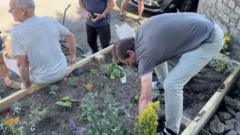Did This Man Just Pay for Destroying a Village Flowerbed?

Published: 2025-09-12 16:28:13 | Category: wales
A man involved in the destruction of a community flowerbed has reached an out-of-court settlement, agreeing to pay compensation to a local church. Michael Hodgson, a 55-year-old wind turbine company director, faced charges of criminal damage amounting to £178 after wildflowers were uprooted shortly after volunteers planted them. The incident, which gained considerable attention online, raised questions about property boundaries and planning permissions.
Last updated: 11 October 2023 (BST)
Key Takeaways
- Michael Hodgson agreed to pay compensation to a local church as part of an out-of-court settlement.
- The incident involved the destruction of a community flowerbed planted by local volunteers.
- Hodgson claimed the planter encroached on his property and was installed without permission.
- Prosecutors indicated they were satisfied with the community resolution process.
- The case has been adjourned for further communication between police and Hodgson.
The Incident Explained
The community flowerbed in question was torn apart less than 24 hours after volunteers from the Trelawnyd and Gwaenysgor community council had planted it. The destruction was captured on video and circulated widely, prompting outrage among local residents. The incident highlighted ongoing tensions surrounding property boundaries and the rights of local councils versus private property owners.
Background on Michael Hodgson
Michael Hodgson, a resident of the village but currently living abroad, claimed that the flowerbed planter had encroached onto his property. He argued that the planter was set up without the necessary planning permissions and that the materials used were “not environmentally friendly.” His remarks raised concerns not only about the legality of the planter’s installation but also about its environmental impact.
The Legal Proceedings
Following the uprooting of the flowers, Hodgson was charged with criminal damage and faced court proceedings at Mold Magistrates Court. Prosecutor Rhian Jackson confirmed during the hearing that there had been correspondence between the prosecution and defence regarding the alleged damage. In light of this, both parties agreed to an out-of-court settlement, allowing the case to be resolved without a trial.
Community Resolution and Compensation
As part of the community resolution process, Hodgson was required to pay a sum of money to a local church, a decision facilitated by his defence lawyer, Selina Woodard. Woodard stated that Hodgson and his wife had endured significant stress throughout the ordeal. The community resolution approach signifies a shift towards restorative justice, aiming to repair harm rather than solely punish offenders.
Next Steps in the Case
The case has been adjourned until next month as North Wales Police work to communicate with Hodgson regarding the remaining aspects of the agreement. The judge, District Judge Gwyn Jones, expressed the need for these discussions to ensure all parties are satisfied with the resolution. While Hodgson maintains an address in the village, the complexities of his situation are yet to be fully resolved.
Why This Matters
This incident underscores the importance of community involvement in local projects and the potential for conflicts when boundaries and permissions are unclear. It also reflects a growing trend in the UK towards community resolutions in legal disputes, which may offer a more harmonious and constructive approach to conflict resolution.
Public Reaction and Community Impact
The uprooting of the flowerbed stirred significant public anger, highlighting the community’s investment in local beautification efforts. Residents expressed their disappointment not only at the destruction of the flowers but also at the perceived disregard for community initiatives. This situation serves as a reminder of how vital community engagement is in maintaining local pride and cohesion.
Environmental Considerations
Hodgson's comments regarding the environmental impact of the planter materials raise additional questions about sustainability in community projects. As local councils push for greener initiatives, ensuring that all materials used are environmentally friendly becomes crucial. This incident may prompt future discussions about best practices for community projects and the importance of using sustainable resources.
Conclusion
The resolution of this case highlights an evolving approach to community disputes and the potential for restorative justice to foster better relationships among residents. As local councils continue to implement community projects, clear communication and adherence to planning regulations will be essential in preventing similar conflicts in the future. The incident also serves as a lesson in the importance of protecting community spaces and resources.
What steps do you think communities should take to prevent similar disputes in the future? #CommunityEngagement #RestorativeJustice #EnvironmentalSustainability
FAQs
What was the incident involving Michael Hodgson?
Michael Hodgson was charged with criminal damage after uprooting a community flowerbed shortly after it was planted by volunteers, claiming it encroached on his property.
What was the outcome of the court case?
The case was settled out of court, with Hodgson agreeing to pay compensation to a local church as part of a community resolution.
Why did the community react strongly to the incident?
The community was upset because the flowerbed represented a local beautification effort, and residents felt disrespected by the destruction of their work.
What are community resolutions?
Community resolutions are alternatives to traditional legal proceedings, focusing on repairing harm and restoring relationships rather than purely punishing the offender.
What environmental concerns were raised?
Hodgson raised issues about the materials used in the flowerbed planter, arguing they were not environmentally friendly, which highlights the need for sustainable practices in community projects.



